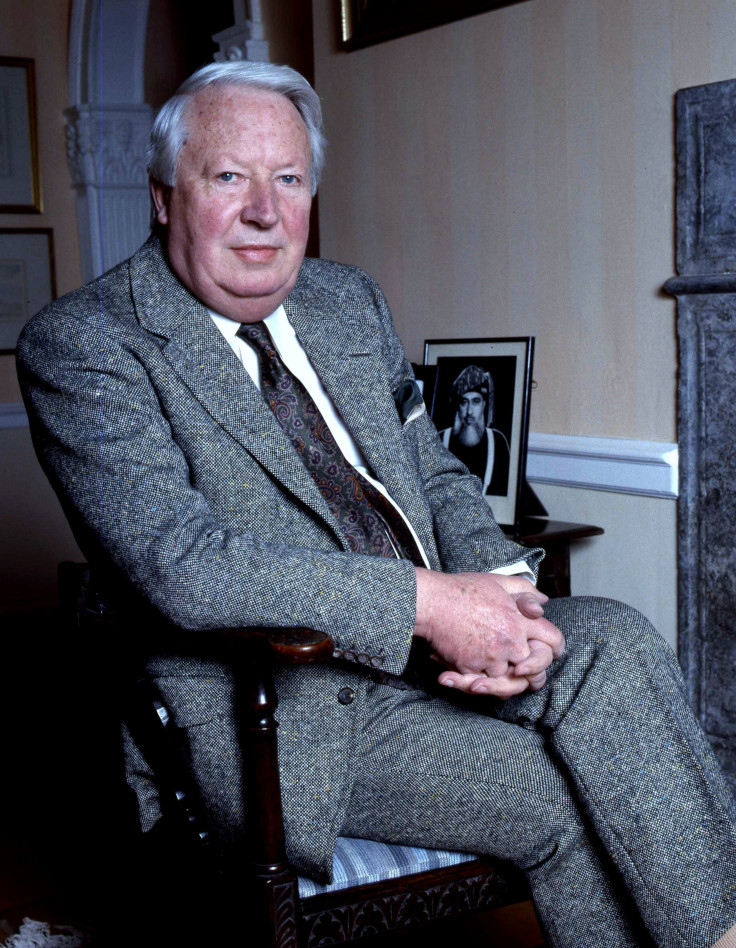Edward Heath: Britain’s Forgotten And Mysterious Prime Minister

Forty-three years ago this week, a man named Edward "Ted" Heath became the British prime minister. Heath is a largely forgotten figure today on both sides of the Atlantic -- if he is remembered for anything, it might be his bitter rivalry with Margaret Thatcher, who took away leadership of the Conservative Party from him and remained his enemy until death.
On a side note, Heath did attain a kind of unusual and priceless bit of immortality after The Beatles mentioned him and Labour Prime Minister Harold Wilson in the chorus of their classic 1966 song "Taxman" (“Ah-ah, Mister Wilson! Ah-ah, Mister Heath!”).
But Ted Heath led a fascinating and mysterious life – one which included a dangerous secret that could have derailed his career at any time. Heath, who never married, is widely believed to have been homosexual, although he never publicly commented on such private matters.
Homosexuality was decriminalized in the United Kingdom in 1967 when Heath was more than 50 years old and already deeply into his political career. Heath died in 2005 at the ripe old age of 89, having never discussed his sexual orientation, in keeping with the ethos of his class and upbringing.
“Edward Heath was prime minister between 1970 and 1974, a period when homosexuality was beginning to be talked about more widely, but not necessarily accepted, particularly [among] public figures,” said Dr. Victoria Honeyman, lecturer in British politics at the University of Leeds.
“There were rumors about Heath's sexuality, but the press (both broadcast and print) tended to focus on the safer ground of his unmarried status. This may have had an impact on his political career, the lack of a wife, a 'first lady,' someone to meet dignitaries’ partners etc. ... Publicly, however, rumors about his sexuality were dealt with as gossip.”
Indeed, Thatcher herself alluded to Heath's “bachelor status” when she successfully wrested the leadership of the Conservative Party away from him, earning his eternal wrath.
During Heath's term in office, such rumors were only whispers, and nothing was ever conclusively proven during his long life.
A biography of Heath released in 1993 (while he was still alive) indicated there was "no positive evidence" he was gay. In his own memoirs, Heath claimed he was too busy establishing his political career to get married.
But Heath has been posthumously “outed” by various sources.
In an authorized biography of Thatcher written by Charles Moore, a former Conservative minister and editor of the Daily Telegraph, Bill Deedes, is quoted as saying that Thatcher told him in 1976 she was convinced Heath was gay.
In 2007, a former Conservative member of the London Assembly and former mayor of Barnet named Brian Coleman, who is himself gay, made a more sensational charge. Coleman alleged that in the mid-1950s, London police were aware that Heath was "cottaging" (that is, seeking out anonymous sex partners in public lavatories) and that they warned him to stop, lest it damage his career. (Indeed, in 1955, Heath went on to become a privy councilor and chief whip under then-Prime Minister Anthony Eden).
Coleman also claimed that gays "ran" the Conservative Party in London for many years, suggesting Heath may have been “protected.”
“[Britain] had managed for decades with gay men holding a significant number of public offices,” Coleman wrote in the New Statesman.
Metro newspaper, quoted Peter Tatchell, a prominent British gay rights activist, saying, “It’s a long-standing open secret. It is amazing his sexuality wasn’t the subject of tabloid revelations during his lifetime.”
But some of Heath’s peers dismissed these allegations.
Sir Peter Tapsell, a Conservative MP, told the Mirror newspaper in 2007: “I knew [Heath] well and would be astonished if he was a practicing homosexual.”
Derek Conway, who succeeded Heath as the MP for Bexley and Old Sidcup, scoffed: “Ted was wedded to politics. He didn’t have a great deal of companionship, but there are people capable of getting on with their lives without companionship.”
Nonetheless, Heath’s sexual orientation might also have been suspected by some foreign nations, including Communist states during the height of the Cold War.
The BBC reported that during the early 1960s, when Heath served as a Conservative Cabinet minister, the Czech secret service attempted to blackmail him into working as a Communist spy in Westminster. The allegations came from a Czech defector named Josef Frolik.
Frolik claimed that the plot was dashed only after Britain’s MI5 intelligence agency warned Heath of its existence.
But there is no evidence of such a plot in Prague’s secret service archives, the BBC noted. Another former Czech spy named Jan Mrazek said that Heath himself told him that the whole conspiracy was orchestrated by right-wing extremists in Britain, perhaps within the Conservative Party itself, to undermine Heath.
Heath’s single four-year term as prime minister during the first half of the 1970s included a bitter battle against trade unions who demanded higher pay and shorter work weeks, an endless series of labor strikes and power cuts, as well as the UK’s entry into the European Economic Community.
Heath apparently did not impress the electorate, given that he lost in humiliating fashion to Labour in a snap election.
© Copyright IBTimes 2025. All rights reserved.





















